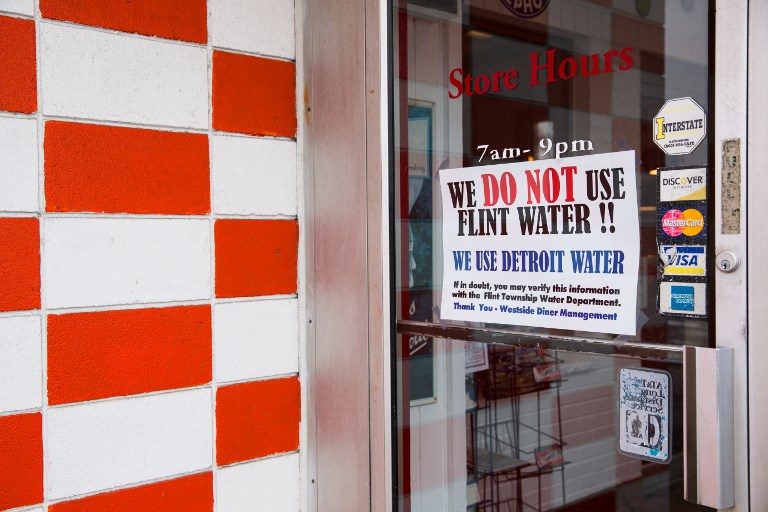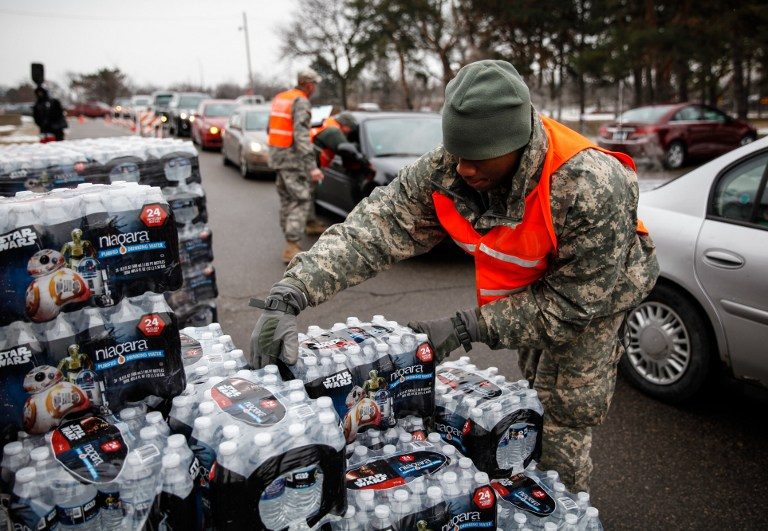SUMMARY
This is AI generated summarization, which may have errors. For context, always refer to the full article.

This compilation was migrated from our archives
Visit the archived version to read the full article.
FLINT, Michigan, USA – Eighty-year-old Melvina Fields worries about getting contaminated water in her mouth each time she bathes. But what upsets her most, as the crisis in Flint drags on, is the thought of the babies harmed by the city’s lead-tainted water supply.
The slightest household chore is a challenge without a steady supply of clean water, as the poor and mostly black Michigan city discovered the hard way after the scandal broke 4 months ago and its entire population switched in a panic from tap to bottled water.
It takes time to fill a cooking pot or a sink to wash dishes, one bottle at a time. It takes time to trudge back and forth to stock up on water bottles. And officials have no idea how long it will be until the city’s corroded pipes stop leaching poisonous lead.
There’s the stress of trying to bathe without ingesting any water, and never feeling like your clothes are really clean when they come out of the washing machine.
“I tell my husband to not get any on his lips or in his mouth because it’s contaminated,” Fields said, as a soldier handing out bottled water at a fire station lifted a case into the car of the neighbor who drove her there.
“I think it’s worse on the little bitty kids just born in this world,” Fields told Agence France-Presse. “Their mother goes to fix formula out of river water. It messes up their little heads.”
Lead exposure is harmful to everyone, but it can have devastating impacts on young children by irreversibly harming brain development. It has been shown to lower intelligence, stunt growth and lead to aggressive and anti-social behaviors.
The US Justice Department is investigating why it took until October 2015 for officials to tell residents to stop drinking Flint’s water despite months of tests showing dangerous high levels of lead.
Flint residents have since been been told to consume only filtered or bottled water.
‘How long?’
Flint residents began complaining that the foul-smelling and discolored water coming out of their taps was making them sick soon after city officials switched to a new water supply in April 2014 in an effort to cut costs.
One of Chantel Jackson’s grandsons has since tested positive for lead in his blood. And while doctors assured her that the amount of lead in his system wasn’t enough to pose a long-term threat to his health she can’t quite believe them.
The anxiety about what the water may have done to her children and grandchildren is overwhelming, said the 55-year-old, as her teenaged son helped her load bottled water into their car.
“You’re worried about your kids,” Jackson told Agence France-Presse, “How long is this supposed to go on… and what’s going to happen next and what’s going to happen to them.”

“I think it’s worse on the little bitty kids just born in this world”
Months after officials admitted the water was unsafe, fearful and frustrated residents have resigned themselves to the drudgery of packing their cars with cases of bottled water.
“Water is like liquid gold around here,” said David Madden, 56, as he picked up his latest shipment of bottles.
Madden, who lives on a fixed income from disability payments, tries to ration his family’s use of bottled water by using it only for drinking, cooking and cleaning dishes.
Bottled water is now being handed out for free by the National Guard. But Madden still finds himself eating up time and fuel driving to the fire station nearly every day to fill up as the empty plastic bottles pile up.
Governor Rick Snyder – who faces calls to resign over his handling of the scandal – on Wednesday, February 3, sought $30 million to repay residents for most of what they’ve spent on their water bills since the ill-fated switch.
‘Clean uniform for work’

It’s a welcome move, but won’t begin to compensate people for the expense incurred until the city admitted its water was unsafe and began distributing bottles.
Verastine Lane, 65, had been buying bottled water with her own money for nearly two years because she didn’t trust what was coming out of her taps.
“I’m glad they’re giving it to us now. It was getting kind of expensive,” said Lane, who has lived in the same house for 45 years in Flint’s north side neighborhood, a predominantly African-American community of modest bungalows, boarded-up store fronts and crumbling sidewalks and streets.
Nurse Shawnty Knox, 44, says she boils tap water to use in her washing machine because otherwise her clothes don’t come out clean. She also boils water to scrub her dishes, then rinses them in a separate sink with bottled water.
“I don’t have a lot of time but you do what you’ve got to do,” said Knox, who cares for three children ages 11 to 19 at home. “You want to have a clean uniform for work every day.”
Terrell Bowers, 70, said she thinks about moving away from Flint nearly every day. But 30 years after moving back home to take care of her aging parents, it’s hard to imagine starting a new life somewhere else.
“I have my church group and my friends,” she said. – Joseph Szczesny, AFP / Rappler.com
Add a comment
How does this make you feel?
There are no comments yet. Add your comment to start the conversation.